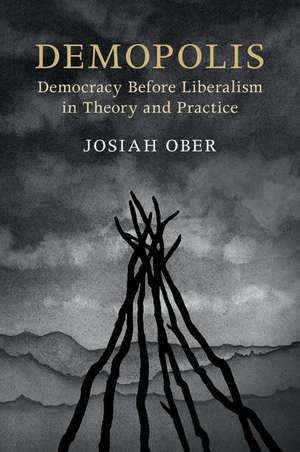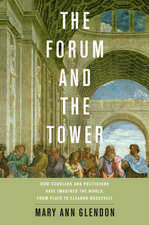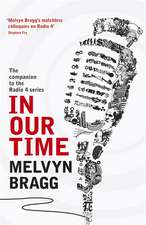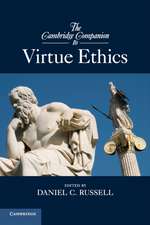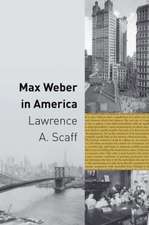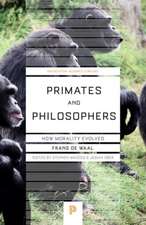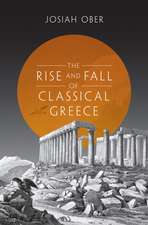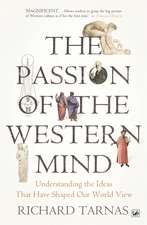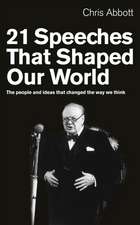Demopolis: Democracy before Liberalism in Theory and Practice: The Seeley Lectures
Autor Josiah Oberen Limba Engleză Paperback – 13 iul 2017
| Toate formatele și edițiile | Preț | Express |
|---|---|---|
| Paperback (1) | 159.18 lei 3-5 săpt. | +34.40 lei 7-13 zile |
| Cambridge University Press – 13 iul 2017 | 159.18 lei 3-5 săpt. | +34.40 lei 7-13 zile |
| Hardback (1) | 580.80 lei 6-8 săpt. | |
| Cambridge University Press – 19 iul 2017 | 580.80 lei 6-8 săpt. |
Preț: 159.18 lei
Nou
Puncte Express: 239
Preț estimativ în valută:
30.46€ • 31.80$ • 25.21£
30.46€ • 31.80$ • 25.21£
Carte disponibilă
Livrare economică 14-28 martie
Livrare express 28 februarie-06 martie pentru 44.39 lei
Preluare comenzi: 021 569.72.76
Specificații
ISBN-13: 9781316649831
ISBN-10: 1316649830
Pagini: 222
Dimensiuni: 152 x 227 x 11 mm
Greutate: 0.37 kg
Editura: Cambridge University Press
Colecția Cambridge University Press
Seria The Seeley Lectures
Locul publicării:Cambridge, United Kingdom
ISBN-10: 1316649830
Pagini: 222
Dimensiuni: 152 x 227 x 11 mm
Greutate: 0.37 kg
Editura: Cambridge University Press
Colecția Cambridge University Press
Seria The Seeley Lectures
Locul publicării:Cambridge, United Kingdom
Cuprins
List of figures and tables; Preface; Acknowledgements; Note on the text; 1. Basic democracy; 2. The meaning of democracy in classical Athens; 3. Founding Demopolis; 4. Legitimacy and civic education; 5. Human capacities and civic participation; 6. Civic dignity and other necessary conditions; 7. Delegation and expertise; 8. A theory of democracy; Epilogue. Democracy after liberalism; Bibliography; Index.
Recenzii
'Demopolis is Josiah Ober's long-awaited case for the intrinsic value of democracy, not liberal democracy, but democracy simply, the project of collective self-governance. Ober provides a clear and clarifying analytical framework for understanding democracy itself, prior to or apart from its admixture with liberalism. The result is not merely a powerful work in political philosophy but also a compelling argument for the human value of dignitarian democracy: forms of self-rule defined and constrained by the value of human dignity. This book is a masterpiece.' Danielle Allen, Harvard University, Massachusetts
'There is no better guide than Joshiah Ober to Athenian democracy, and now, also to its significance for understanding the value of democracy today, even where modern liberal rights and values may not exist. This book combines history and theory in a political tour de force.' Melissa Lane, Princeton University, New Jersey
'Demopolis is a tightly reasoned work of scholarship … Mr Ober is an excellent writer and his argument is worth the effort. He believes today's liberals, following the political philosopher John Rawls, conflate liberalism and democracy in ways that make it difficult to assess one without the other.' Barton Swaim, Wall Street Journal
'Ober concludes that basic democracy might form an alternative foundation in light of current challenges to liberalism, such as populist nationalism. This conclusion will not convince all, but Ober's work is thorough and thought-provoking. Highly Recommended.' J. Heyrman, Choice
'There is no better guide than Joshiah Ober to Athenian democracy, and now, also to its significance for understanding the value of democracy today, even where modern liberal rights and values may not exist. This book combines history and theory in a political tour de force.' Melissa Lane, Princeton University, New Jersey
'Demopolis is a tightly reasoned work of scholarship … Mr Ober is an excellent writer and his argument is worth the effort. He believes today's liberals, following the political philosopher John Rawls, conflate liberalism and democracy in ways that make it difficult to assess one without the other.' Barton Swaim, Wall Street Journal
'Ober concludes that basic democracy might form an alternative foundation in light of current challenges to liberalism, such as populist nationalism. This conclusion will not convince all, but Ober's work is thorough and thought-provoking. Highly Recommended.' J. Heyrman, Choice
Notă biografică
Descriere
What did democracy mean before liberalism? What are the consequences for our lives today? These questions are examined by this book.
